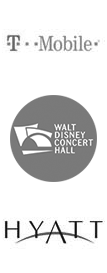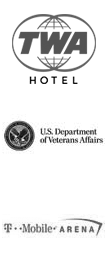Government & Public Works

In government buildings, robust cellular coverage is essential for a multitude of reasons. Effective communication is crucial, enabling government employees to stay in touch with colleagues, stakeholders, and the public. This connectivity ensures that operations run smoothly and that information can be exchanged efficiently, supporting the overall functionality of government services.
Emergency services also rely heavily on strong cellular coverage. In the event of an emergency, it is vital that both employees and visitors can promptly reach emergency responders. This capability enhances the safety and security of everyone within the building.
Productivity within government buildings is significantly bolstered by reliable cellular networks. Employees frequently use mobile devices for a variety of work-related tasks, including email, video conferencing, and accessing data. Good cellular coverage ensures that these activities can be carried out without interruption, contributing to higher efficiency and effectiveness in government operations.
Access to information is another key benefit of strong cellular coverage. Both employees and visitors need to access information about government services, procedures, and policies quickly and conveniently. Reliable cellular networks facilitate this access, ensuring that everyone can obtain the information they need without delay.
Security systems within government buildings also depend on robust cellular coverage. Many security cameras, alarm systems, and other safety measures require wireless connectivity to function effectively. Strong cellular networks ensure that these systems operate reliably, maintaining the security of the building and its occupants.
Similarly, robust cellular coverage is crucial in military buildings and installations. Effective and secure communication is essential for coordinating operations, both domestically and internationally. Reliable cellular networks enable military personnel to communicate quickly and securely, ensuring that critical information is transmitted without delay. This connectivity supports operational efficiency, strategic planning, and the overall safety and security of military operations. Additionally, robust cellular coverage ensures that military installations can support modern technological applications and systems, which are integral to contemporary military functions.
However, several factors can contribute to poor cellular coverage in government buildings. The construction materials used in many government structures, such as metal and concrete, can interfere with cellular signals and reduce coverage. The layout of these buildings, including walls, partitions, and ceilings, can further obstruct signals, making it challenging to maintain consistent coverage.
The presence of electronic equipment, such as security systems and communication networks, can create interference that impacts cellular performance. Additionally, the high density of users within government buildings can lead to network congestion, reducing coverage and increasing the risk of interference. Other wireless devices operating in the same frequency spectrum can also cause spectrum interference, leading to dropped calls and reduced data speeds.
Security considerations in some government buildings may include measures that limit or block cellular signals, further impacting coverage. These factors can disrupt cellular service, making it difficult for employees and visitors to access reliable mobile services, ultimately affecting their productivity and overall experience.
Addressing these challenges requires the expertise of specialized companies that can implement tailored solutions to enhance cellular coverage in government buildings. By leveraging advanced technologies and industry best practices, these experts can ensure that government buildings, including military installations, benefit from robust and reliable cellular connectivity, supporting communication, productivity, and security.
Our Clientele
Explore some of the great companies that RSS has worked with.
Why RSS?
The licensed wireless industry is intricate. Experience has been a part of Repeated Signal Solutions (RSS) from the company’s inception in 2004. Unlike our rivals, RSS has been active in the licensed wireless frequency market for 19 years and still represents the majority of our first clients nationally.
- 1
Financial Transparency
The RSS methodology has been demonstrated to put everyone at ease. This approach is the result of 19 years of expertise. - 2
Trust: 92%+ of Our Customers Are Recurring
Among licensed wireless services, RSS is one of the few that puts the client first. - 3
Respect and Understanding for All Stakeholders
To ensure that each party contributes for their use case, our process supports the creation of budgets for each group’s allocation of the system. - 4
Total Solution Experience
We offer end-to-end life cycles with the standard carriers SLAs starting at 10 years as part of our solutions.
Ready to Speak With Our Team?
RSS’ mission is to act on behalf of our customers and provide innovative methodologies and detailed solutions that meet their wireless coverage challenges. We strive to provide value propositions based upon ethical business approaches with a high level of transparency and communication which builds mutual trust, respect and a basis for replicable results in our products and services delivery.
Pete Bohley, President of RSS
























